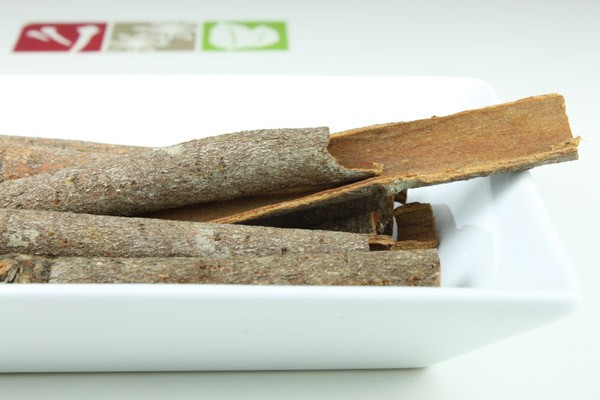Dalchini Cassia cinnamon bark

Dalchini is the name given to Chinese cinnamon in India. The unpeeled bark of the Cassia cinnamon tree is used there to prepare stews. The aroma is quite restrained in the unground state and is therefore particularly suitable for preparing long-cooked stews and for "perfuming" Vietnamese and Thai soups. Previous roasting in hot oil enhances the aroma.
Prices incl. VAT plus shipping costs
Delivery time approx. 5 working days
- Order number: 11641050
- Open text field 1: China cinnamon, cassia cinnamon, cinnamon bark, dalchini
- Open text field 2: 09061900
also: china cinnamon, cassia cinnamon, cinnamon bark
Description:
Cinnamon has been known for thousands of years. The aromatic spice is the bark of the cinnamon plant. Since the aroma of the whole cassia cinnamon is only expressed through fine grinding, it is necessary to boil the sticks for a long time. They are therefore intended rather for light "perfuming" of dishes.
In Europe, cinnamon is mainly used for desserts. Its distinctive sweet aroma gives a characteristic flavor to rice pudding, baked apples, compotes and various pastries. Only in Southeastern Europe is cinnamon traditionally used (albeit in small quantities) to flavor ground meat.
In India, the Arab world and especially in China, cinnamon is naturally used in the preparation of savory dishes. In Chinese stews, for example, it is used liberally in combination with soy sauce and star anise. Indian curries, pilafs and garam masalas also frequently feature cinnamon as a seasoning ingredient. Characteristic of oriental cuisine is the often sweet taste of savory dishes. In addition to various dried fruits (figs, apricots, raisins) and spices (cardamom, cloves), cinnamon is also responsible for the sweet character of the dishes. It flavors tajines, stews, couscous and other dishes based on meat or vegetables. For this reason, it is also found in numerous traditional spice mixtures there.
Cassia cinnamon contains significantly more coumarin than Ceylon cinnamon, which is why its flavor is more pronounced. In case of frequent and generous use and known coumarin intolerance, it is recommended to use Ceylon cinnamon.
Usage:
Use dalchini in quantity according to taste. The cinnamon pieces should be added at the beginning of the preparation. The aroma of dalchini can be enhanced by roasting in hot oil.
Known dishes:
Cinnamon stars, lamb tagine, mishmisheya, bifteki, baked apple, rice pudding, master sauce, kibba, falafel, cinnamon tea.
Aroma/Taste:
Restrained, sweet cinnamon aroma; spicy.
Harmonizes with:
Fennel, ginger, cardamom, coriander, nutmeg, clove, star anise, Szechuan pepper
Origin:
China
| Aroma: | earthy/resinous, sweetish |












































